Reflective Analysis: MGT600 Management, People, and Teams Module
VerifiedAdded on 2022/08/17
|5
|1178
|18
Report
AI Summary
This report is a reflective analysis of an introductory module on management, people, and teams. The student reflects on the key principles of people management, leadership styles, and challenges such as communication issues, cross-cultural conflicts, and time management. The report highlights the importance of these concepts for aspiring managers, emphasizing the relevance of topics like power, politics, and organizational culture in a globalized environment. The student discusses how the module has enhanced their understanding of managerial roles, responsibilities, and the application of skills like time management and communication. The analysis concludes with the student's realization of the value of the module's content for future studies and workplace scenarios, emphasizing the need for innovation and empathy in managing organizations.
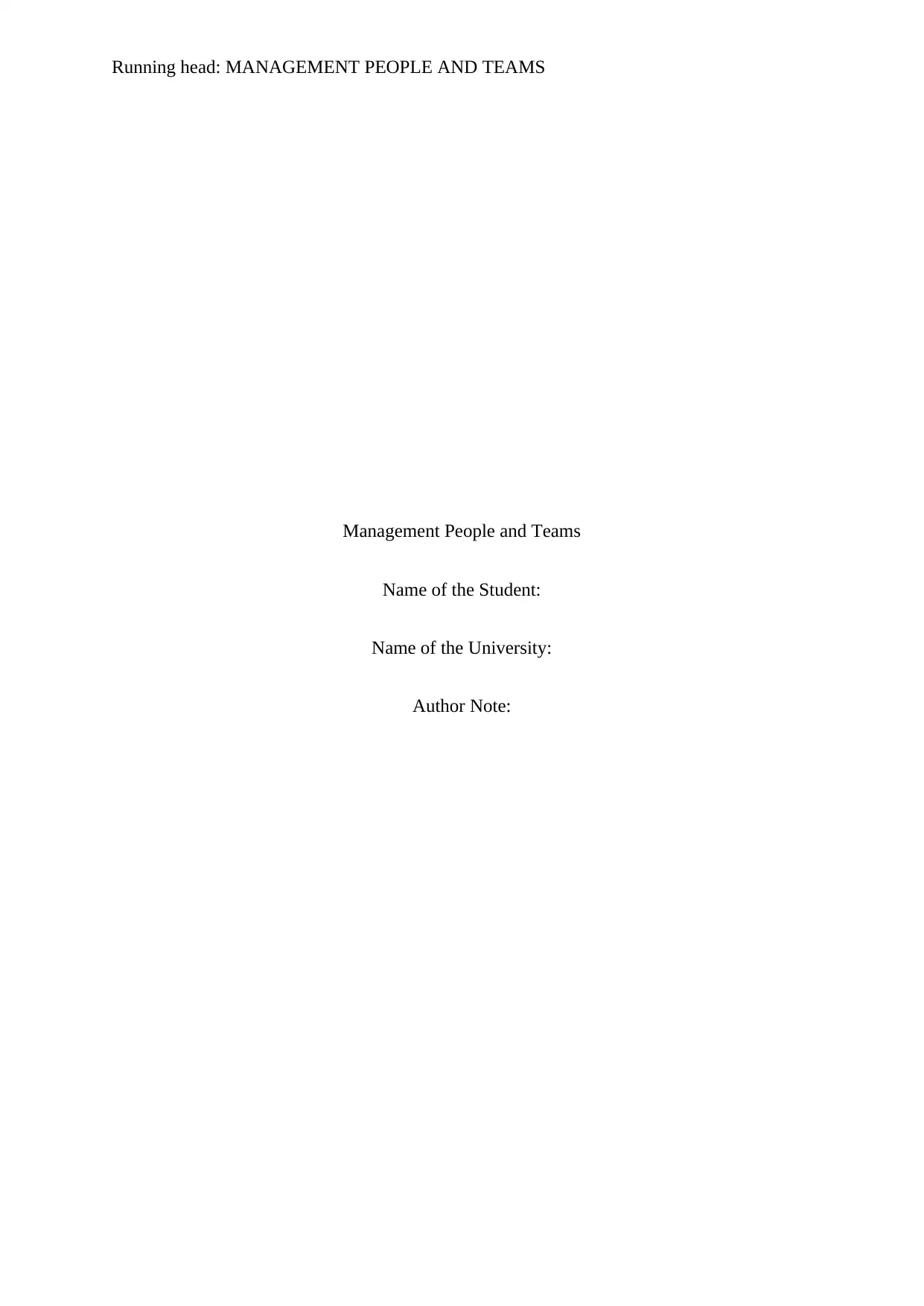
Running head: MANAGEMENT PEOPLE AND TEAMS
Management People and Teams
Name of the Student:
Name of the University:
Author Note:
Management People and Teams
Name of the Student:
Name of the University:
Author Note:
Paraphrase This Document
Need a fresh take? Get an instant paraphrase of this document with our AI Paraphraser
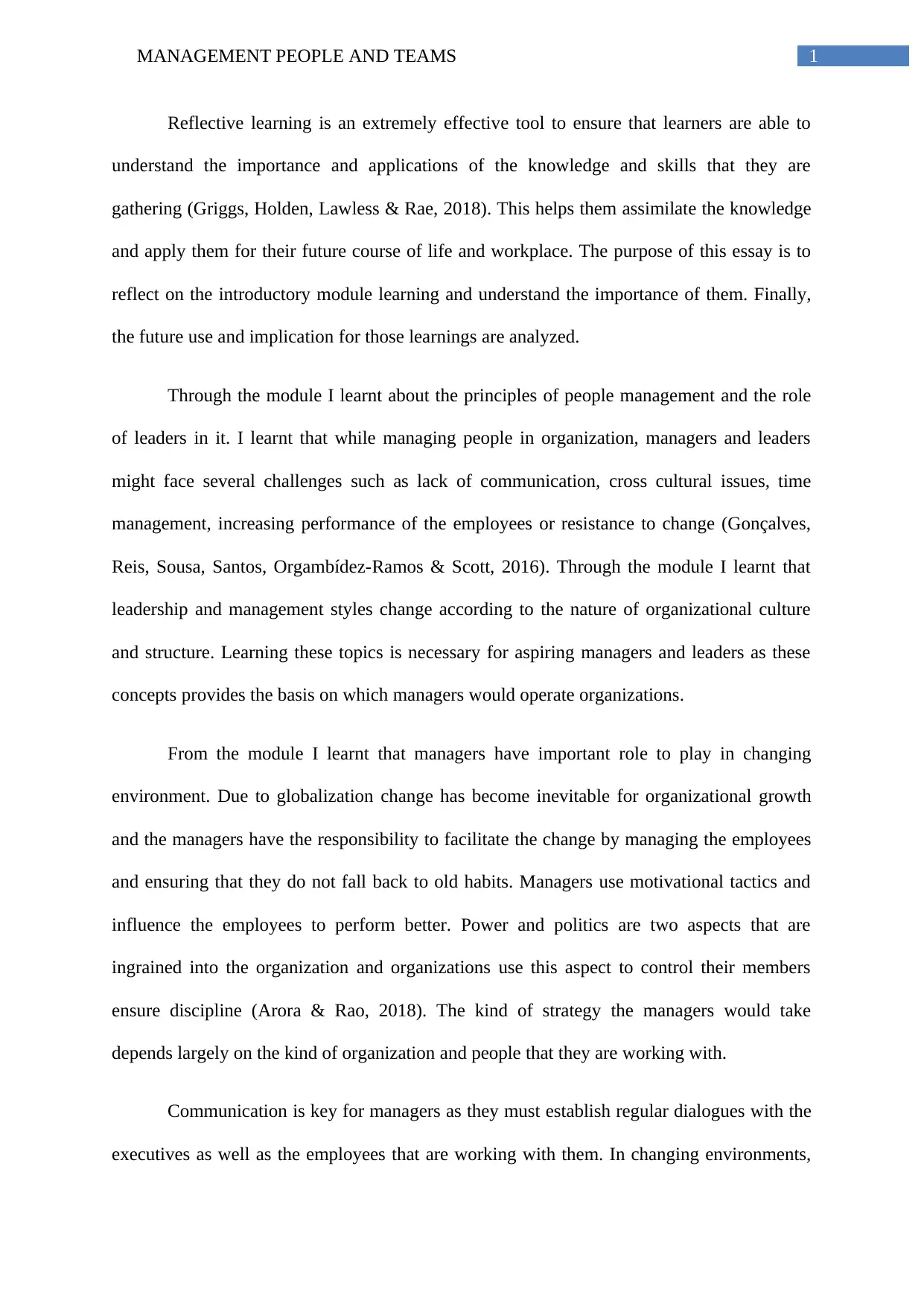
1MANAGEMENT PEOPLE AND TEAMS
Reflective learning is an extremely effective tool to ensure that learners are able to
understand the importance and applications of the knowledge and skills that they are
gathering (Griggs, Holden, Lawless & Rae, 2018). This helps them assimilate the knowledge
and apply them for their future course of life and workplace. The purpose of this essay is to
reflect on the introductory module learning and understand the importance of them. Finally,
the future use and implication for those learnings are analyzed.
Through the module I learnt about the principles of people management and the role
of leaders in it. I learnt that while managing people in organization, managers and leaders
might face several challenges such as lack of communication, cross cultural issues, time
management, increasing performance of the employees or resistance to change (Gonçalves,
Reis, Sousa, Santos, Orgambídez-Ramos & Scott, 2016). Through the module I learnt that
leadership and management styles change according to the nature of organizational culture
and structure. Learning these topics is necessary for aspiring managers and leaders as these
concepts provides the basis on which managers would operate organizations.
From the module I learnt that managers have important role to play in changing
environment. Due to globalization change has become inevitable for organizational growth
and the managers have the responsibility to facilitate the change by managing the employees
and ensuring that they do not fall back to old habits. Managers use motivational tactics and
influence the employees to perform better. Power and politics are two aspects that are
ingrained into the organization and organizations use this aspect to control their members
ensure discipline (Arora & Rao, 2018). The kind of strategy the managers would take
depends largely on the kind of organization and people that they are working with.
Communication is key for managers as they must establish regular dialogues with the
executives as well as the employees that are working with them. In changing environments,
Reflective learning is an extremely effective tool to ensure that learners are able to
understand the importance and applications of the knowledge and skills that they are
gathering (Griggs, Holden, Lawless & Rae, 2018). This helps them assimilate the knowledge
and apply them for their future course of life and workplace. The purpose of this essay is to
reflect on the introductory module learning and understand the importance of them. Finally,
the future use and implication for those learnings are analyzed.
Through the module I learnt about the principles of people management and the role
of leaders in it. I learnt that while managing people in organization, managers and leaders
might face several challenges such as lack of communication, cross cultural issues, time
management, increasing performance of the employees or resistance to change (Gonçalves,
Reis, Sousa, Santos, Orgambídez-Ramos & Scott, 2016). Through the module I learnt that
leadership and management styles change according to the nature of organizational culture
and structure. Learning these topics is necessary for aspiring managers and leaders as these
concepts provides the basis on which managers would operate organizations.
From the module I learnt that managers have important role to play in changing
environment. Due to globalization change has become inevitable for organizational growth
and the managers have the responsibility to facilitate the change by managing the employees
and ensuring that they do not fall back to old habits. Managers use motivational tactics and
influence the employees to perform better. Power and politics are two aspects that are
ingrained into the organization and organizations use this aspect to control their members
ensure discipline (Arora & Rao, 2018). The kind of strategy the managers would take
depends largely on the kind of organization and people that they are working with.
Communication is key for managers as they must establish regular dialogues with the
executives as well as the employees that are working with them. In changing environments,
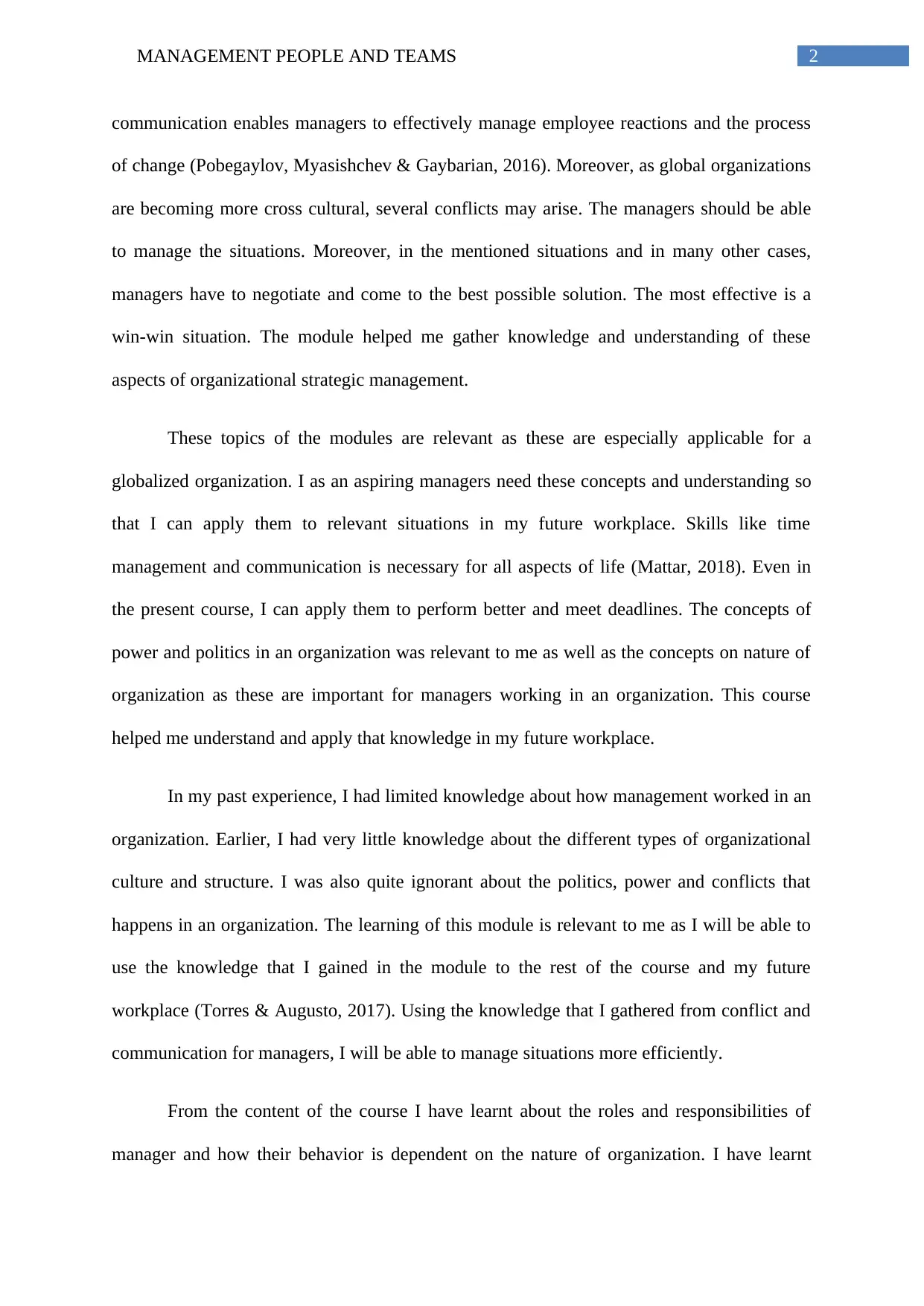
2MANAGEMENT PEOPLE AND TEAMS
communication enables managers to effectively manage employee reactions and the process
of change (Pobegaylov, Myasishchev & Gaybarian, 2016). Moreover, as global organizations
are becoming more cross cultural, several conflicts may arise. The managers should be able
to manage the situations. Moreover, in the mentioned situations and in many other cases,
managers have to negotiate and come to the best possible solution. The most effective is a
win-win situation. The module helped me gather knowledge and understanding of these
aspects of organizational strategic management.
These topics of the modules are relevant as these are especially applicable for a
globalized organization. I as an aspiring managers need these concepts and understanding so
that I can apply them to relevant situations in my future workplace. Skills like time
management and communication is necessary for all aspects of life (Mattar, 2018). Even in
the present course, I can apply them to perform better and meet deadlines. The concepts of
power and politics in an organization was relevant to me as well as the concepts on nature of
organization as these are important for managers working in an organization. This course
helped me understand and apply that knowledge in my future workplace.
In my past experience, I had limited knowledge about how management worked in an
organization. Earlier, I had very little knowledge about the different types of organizational
culture and structure. I was also quite ignorant about the politics, power and conflicts that
happens in an organization. The learning of this module is relevant to me as I will be able to
use the knowledge that I gained in the module to the rest of the course and my future
workplace (Torres & Augusto, 2017). Using the knowledge that I gathered from conflict and
communication for managers, I will be able to manage situations more efficiently.
From the content of the course I have learnt about the roles and responsibilities of
manager and how their behavior is dependent on the nature of organization. I have learnt
communication enables managers to effectively manage employee reactions and the process
of change (Pobegaylov, Myasishchev & Gaybarian, 2016). Moreover, as global organizations
are becoming more cross cultural, several conflicts may arise. The managers should be able
to manage the situations. Moreover, in the mentioned situations and in many other cases,
managers have to negotiate and come to the best possible solution. The most effective is a
win-win situation. The module helped me gather knowledge and understanding of these
aspects of organizational strategic management.
These topics of the modules are relevant as these are especially applicable for a
globalized organization. I as an aspiring managers need these concepts and understanding so
that I can apply them to relevant situations in my future workplace. Skills like time
management and communication is necessary for all aspects of life (Mattar, 2018). Even in
the present course, I can apply them to perform better and meet deadlines. The concepts of
power and politics in an organization was relevant to me as well as the concepts on nature of
organization as these are important for managers working in an organization. This course
helped me understand and apply that knowledge in my future workplace.
In my past experience, I had limited knowledge about how management worked in an
organization. Earlier, I had very little knowledge about the different types of organizational
culture and structure. I was also quite ignorant about the politics, power and conflicts that
happens in an organization. The learning of this module is relevant to me as I will be able to
use the knowledge that I gained in the module to the rest of the course and my future
workplace (Torres & Augusto, 2017). Using the knowledge that I gathered from conflict and
communication for managers, I will be able to manage situations more efficiently.
From the content of the course I have learnt about the roles and responsibilities of
manager and how their behavior is dependent on the nature of organization. I have learnt
⊘ This is a preview!⊘
Do you want full access?
Subscribe today to unlock all pages.

Trusted by 1+ million students worldwide
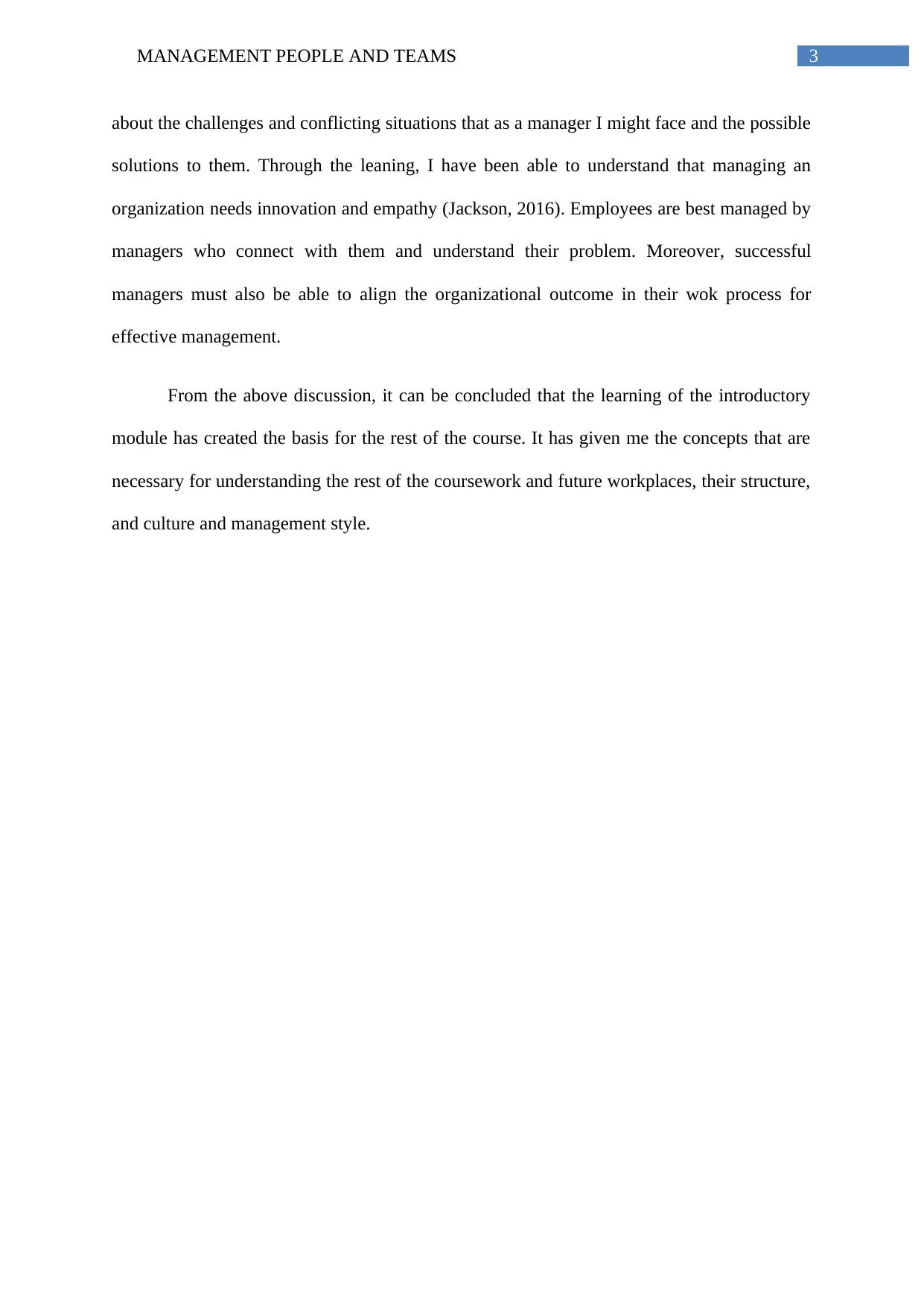
3MANAGEMENT PEOPLE AND TEAMS
about the challenges and conflicting situations that as a manager I might face and the possible
solutions to them. Through the leaning, I have been able to understand that managing an
organization needs innovation and empathy (Jackson, 2016). Employees are best managed by
managers who connect with them and understand their problem. Moreover, successful
managers must also be able to align the organizational outcome in their wok process for
effective management.
From the above discussion, it can be concluded that the learning of the introductory
module has created the basis for the rest of the course. It has given me the concepts that are
necessary for understanding the rest of the coursework and future workplaces, their structure,
and culture and management style.
about the challenges and conflicting situations that as a manager I might face and the possible
solutions to them. Through the leaning, I have been able to understand that managing an
organization needs innovation and empathy (Jackson, 2016). Employees are best managed by
managers who connect with them and understand their problem. Moreover, successful
managers must also be able to align the organizational outcome in their wok process for
effective management.
From the above discussion, it can be concluded that the learning of the introductory
module has created the basis for the rest of the course. It has given me the concepts that are
necessary for understanding the rest of the coursework and future workplaces, their structure,
and culture and management style.
Paraphrase This Document
Need a fresh take? Get an instant paraphrase of this document with our AI Paraphraser
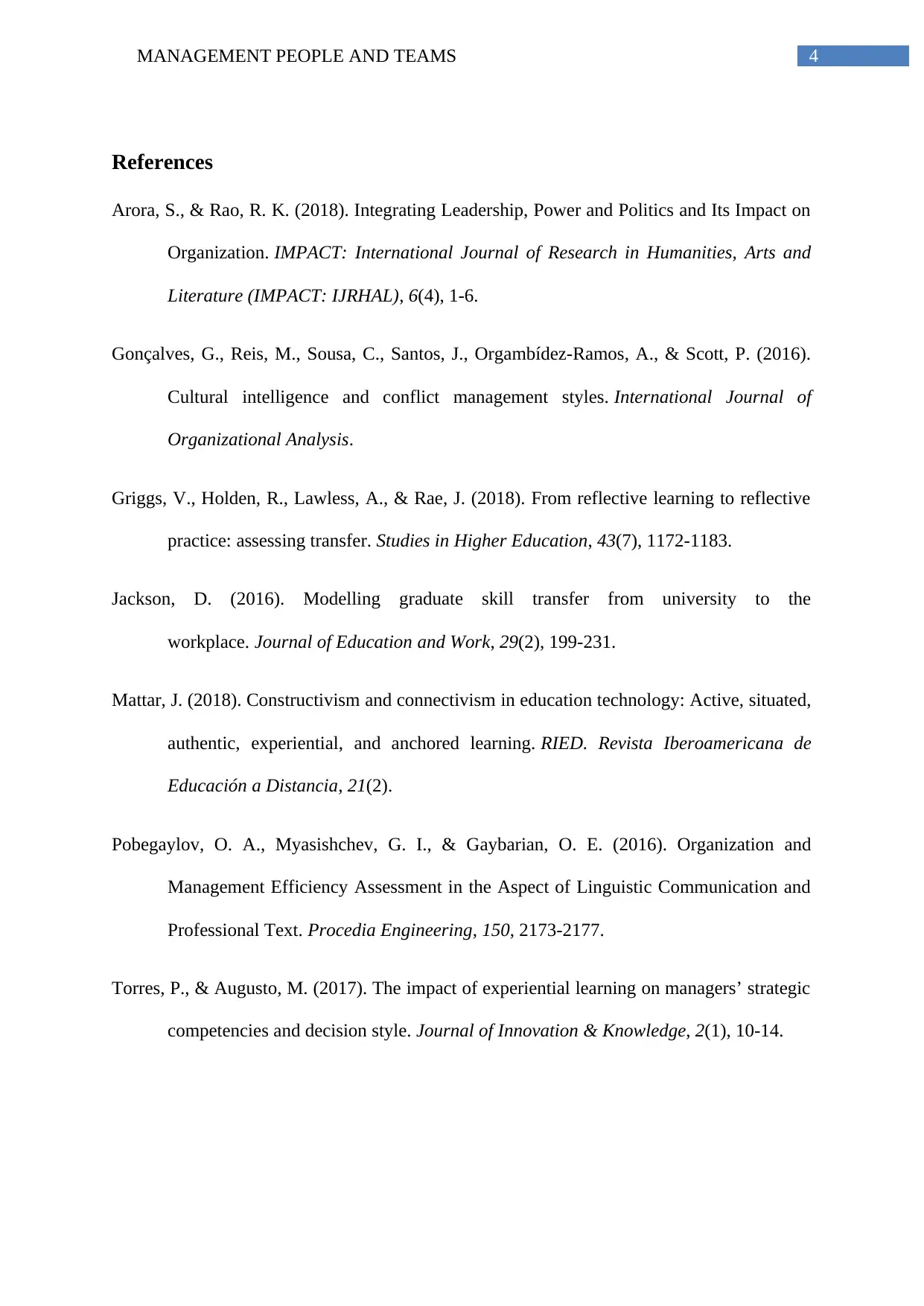
4MANAGEMENT PEOPLE AND TEAMS
References
Arora, S., & Rao, R. K. (2018). Integrating Leadership, Power and Politics and Its Impact on
Organization. IMPACT: International Journal of Research in Humanities, Arts and
Literature (IMPACT: IJRHAL), 6(4), 1-6.
Gonçalves, G., Reis, M., Sousa, C., Santos, J., Orgambídez-Ramos, A., & Scott, P. (2016).
Cultural intelligence and conflict management styles. International Journal of
Organizational Analysis.
Griggs, V., Holden, R., Lawless, A., & Rae, J. (2018). From reflective learning to reflective
practice: assessing transfer. Studies in Higher Education, 43(7), 1172-1183.
Jackson, D. (2016). Modelling graduate skill transfer from university to the
workplace. Journal of Education and Work, 29(2), 199-231.
Mattar, J. (2018). Constructivism and connectivism in education technology: Active, situated,
authentic, experiential, and anchored learning. RIED. Revista Iberoamericana de
Educación a Distancia, 21(2).
Pobegaylov, O. A., Myasishchev, G. I., & Gaybarian, O. E. (2016). Organization and
Management Efficiency Assessment in the Aspect of Linguistic Communication and
Professional Text. Procedia Engineering, 150, 2173-2177.
Torres, P., & Augusto, M. (2017). The impact of experiential learning on managers’ strategic
competencies and decision style. Journal of Innovation & Knowledge, 2(1), 10-14.
References
Arora, S., & Rao, R. K. (2018). Integrating Leadership, Power and Politics and Its Impact on
Organization. IMPACT: International Journal of Research in Humanities, Arts and
Literature (IMPACT: IJRHAL), 6(4), 1-6.
Gonçalves, G., Reis, M., Sousa, C., Santos, J., Orgambídez-Ramos, A., & Scott, P. (2016).
Cultural intelligence and conflict management styles. International Journal of
Organizational Analysis.
Griggs, V., Holden, R., Lawless, A., & Rae, J. (2018). From reflective learning to reflective
practice: assessing transfer. Studies in Higher Education, 43(7), 1172-1183.
Jackson, D. (2016). Modelling graduate skill transfer from university to the
workplace. Journal of Education and Work, 29(2), 199-231.
Mattar, J. (2018). Constructivism and connectivism in education technology: Active, situated,
authentic, experiential, and anchored learning. RIED. Revista Iberoamericana de
Educación a Distancia, 21(2).
Pobegaylov, O. A., Myasishchev, G. I., & Gaybarian, O. E. (2016). Organization and
Management Efficiency Assessment in the Aspect of Linguistic Communication and
Professional Text. Procedia Engineering, 150, 2173-2177.
Torres, P., & Augusto, M. (2017). The impact of experiential learning on managers’ strategic
competencies and decision style. Journal of Innovation & Knowledge, 2(1), 10-14.
1 out of 5
Related Documents
Your All-in-One AI-Powered Toolkit for Academic Success.
+13062052269
info@desklib.com
Available 24*7 on WhatsApp / Email
![[object Object]](/_next/static/media/star-bottom.7253800d.svg)
Unlock your academic potential
Copyright © 2020–2026 A2Z Services. All Rights Reserved. Developed and managed by ZUCOL.





